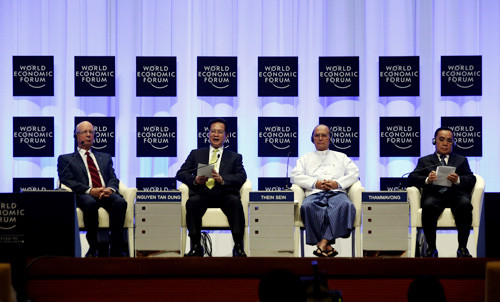|
 |
|
NETWORKED FUTURE: Chairman of the World Economic Forum Klaus Schwab, Vietnamese Prime Minister Nguyen Tan Dung, Myanmar's President U Thein Sein and Lao Prime Minister Thongsing Thammavong (left to right) attend the World Economic Forum on East Asia in Nay Pyi Taw on June 6 (XINHUA) |
Over the course of three days at the World Economic Forum on East Asia, held in Nay Pyi Taw, Myanmar, some 1,000 participants from more than 50 countries debated, among a host of topics, what lies in the future for a robust, networked East Asia. All events and meetings were held in early June at the Myanmar International Convention Center, an impressive 3-year-old, fully equipped complex.
Within the context of East Asia's import-export markets, Myanmar is poised to become an important player, heavily laden with resources like natural gas, timber and gems—close to 40 percent of total exports make their way across the southeastern border with Thailand.
Myanmar on board
It was in the hallowed chambers of the UN headquarters in New York City at the UN General Assembly General Debate on September 27, 2012 that Myanmar's President U Thein Sein addressed representatives of 193 states.
"Economic development must not lead to the widening of the rich-poor gap; citizens' rights are to be protected; the natural environment is to be preserved; our workers are to enjoy rights in line with international standards. We are giving careful attention to investments in the extractive sectors like energy to ensure transparency and impartiality."
He also pinpointed that in terms of economic development, one of the advantages that Myanmar possesses is that it is one of the largest countries in ASEAN, second only to Indonesia in land mass, and remains a bridge between South Asia and Southeast Asia. Technological advancements have lagged behind other ASEAN countries in large part due to crippling U.S. sanctions. This in turn has resulted in insufficient employment opportunities for more than 3 million people in the country.
There is "reason to acquire capital and look forward to the inflow of foreign investment . Our country used to be isolated for the last 20 years. We are now part of the global community," the president said.
In short, Myanmar seems poised to be a cog in elevating this long underestimated region of Asia into the mainstream discussion on the global stage. Although the networked trade of the 10 members of ASEAN and the three countries of China, Japan and South Korea is a far cry from the monolith that is the EU or the strength seen in the North American Free Trade Agreement, the potential remains.
Authoring ASEAN's attitude
Two men well-versed in debating the expansion of East Asia took the floor during one of the first sessions at the World Economic Forum in Myanmar entitled, Accelerating ASEAN's Integration. Kishore Mahbubani, Dean of and a professor in the practice of public policy at the Lee Kuan Yew School of Public Policy at the National University of Singapore, and Anthony F. Fernandes, Group CEO of AirAsia, debated at length their findings.
The professor believes that ASEAN, dating back to its formation in 1967, looks good on paper but the reality of competitive regional economic integration presents a gap that is more than fundamental. Implementation on the ground in the form of reduced tariffs, strengthened customs procedures and the liberalization of investment regimes remain absent.
"The real weak link is small and medium-sized enterprises, while governments haven't realized this. They need to balance this," Mahbubani said. He believes that there is currently a lack of political will to enact change. With Myanmar assuming the rotating chair of ASEAN in 2014, both the association and ultimately, its members, will not want to enter 2015 and 2017 empty-handed, the latter, the 50th anniversary of the bloc.
| 